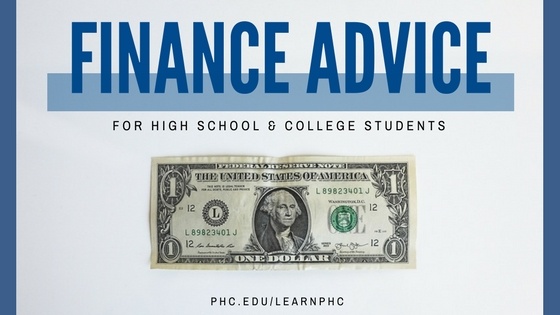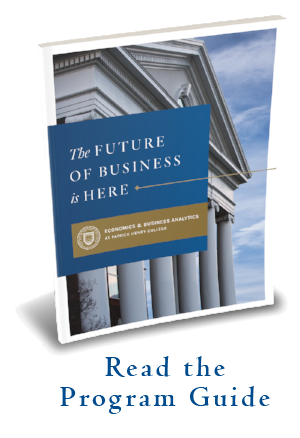 How can students prepare for their financial futures in the now?
How can students prepare for their financial futures in the now?
 Vienna Jacobson, editor of Patrick Henry College's student newspaper The Herald, sat down with PHC’s vice president Howard Schmidt. He's also a professor in PHC's Economics & Business Analytics program.
Vienna Jacobson, editor of Patrick Henry College's student newspaper The Herald, sat down with PHC’s vice president Howard Schmidt. He's also a professor in PHC's Economics & Business Analytics program.
VJ: How does being financially responsible as a student prepare you for life after school?
HS: The Bible says he who is faithful in little things will be faithful in much. So we are stewards of what God has given us, whether that is our gifts, our talents, or our financial resources that are within our influence. As we learn how to be good stewards with what we are given and to be faithful to that, more resources can be provided so that we can have a greater impact on the kingdom.
VJ: Are there steps that you recommend that students can take towards becoming financially responsible?
HS: Every student should think about a budget and balance. The budget is something that says what you're going to spend each month. Students should forecast what they’re going to earn versus what their costs are. If they don't know how to do that, they should find someone who can help them and show them and walk them through it, whether that is a parent or an older student or faculty person.
You want your budget on a spreadsheet, and you want to be able to see it month by month so you can plan appropriately. And budgeting is really not about yes, but it's about no. It is starting to say I'm not going to do this because God has not provided the resources, or  yes, I can do this because God has provided the resource.
yes, I can do this because God has provided the resource.
You should also make a balance sheet. It shows the value of what you have or what you're responsible for — your stewardship. The balance sheet may show some student debt, it may show some car expenses, it may show some cash, it may show some investments, but you should get in some practice before you graduate with a simple spreadsheet that says these are the things of value that I'm a steward over. In some cases, it may be the clothes on your back and a few used books. Write it down. Get used to it. And there may be some debts or some liabilities you have, and that's why it's called the balance sheet; it's balancing your assets.
If you have those basic things in place when you get out of school, then you'll be able to manage resources really, really well. VJ: Is it important to be accountable to someone in your finances? And if so, what does that look like?
VJ: Is it important to be accountable to someone in your finances? And if so, what does that look like?
HS: The answer is yes, and how it looks can change. It could be a friend, a neighbor, a father, a mother. It should be someone that's good at it. It could be on a spreadsheet, so you're tracking what you have and what you spend versus what you're going to spend. A lot of accountability is just a matter of tracking and comparing to what you forecasted. Here's what I forecasted, and here's what actually happened. Why did I go over or why did I go under? Was my forecast improper or was my spending improper? And you have an opportunity then to look at the numbers and figure out how to close the gap. Do I need to work a little harder or do I need to spend a little less? That is really where accountability comes from.
VJ: You can get away with being financially irresponsible in college; do you think that will hurt you in the long run?
HS: I don't think it hurts you, but I think it sets you back. Do you want to graduate still a child or do you want to graduate an adult? That is really the decision that you're making; it's not about "I'm deciding to be responsible" — you are deciding to remain as a child. As an adult you are responsible for things, and you take matters seriously, and so you're preparing yourself for that transition of where you're completely responsible. I don't  think it hurts you; it just puts you behind where you could have been. It's important to honor the Lord in all your gifts and use them fully in the time that you're given, and that includes as a student.
think it hurts you; it just puts you behind where you could have been. It's important to honor the Lord in all your gifts and use them fully in the time that you're given, and that includes as a student.
VJ: What is a good piece of financial advice that you think everyone should follow?
HS: In my class, every week you have a Bible verse to memorize. To say one thing would be really hard because I think that all Scripture integrates with life, which integrates with finance. So wherever you are in personal life or finance the Bible has laid it out very clearly that there is freedom with fences and God has given us those fences. If I had to say, I would say the most important verse is in Ecclesiastes.
Ecclesiastes 11:2 talks about the wisdom of dividing your assets into seven or eight because you don't know about what disaster may come upon the way. All of life has randomness to it, whether you're a believer or an unbeliever. It's going to rain on the just and the unjust. A wise steward is prepared for rain and prepared for sunshine. And so part of the advice that Scripture gives us is to spread out your investments and your savings.
 When you are a graduate, the first thing you want to do is get your cash put in place in case you don't have a job and start paying off your debts, and then start your investments.
When you are a graduate, the first thing you want to do is get your cash put in place in case you don't have a job and start paying off your debts, and then start your investments.
And my greatest advice is to tithe the whole time, because none of this belongs to you, and every time you give a tithe of what your earn you recognize you glorify the Father and that He is a Creator and the sustainer of all your wealth, or lack thereof.
Reporting courtesy of PHC's The Herald, PHC's weekly student publication.
----------------
Learn more about PHC's Economics & Business Analytics major:




